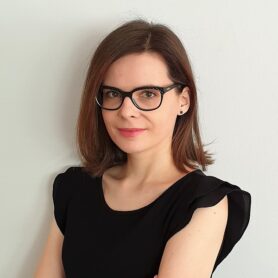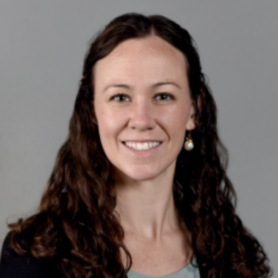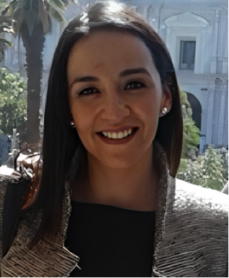
Panel - The Role of Academia and Industry on Solving Community Challenges
IEEE IHTC 2024
This panel will bring together experts from academia and industry to discuss the vital role both sectors play in addressing pressing community challenges through innovative technologies. The conversation will explore the application of AI and emerging technologies in humanitarian efforts, including but not limited to disaster management, climate change mitigation, development of smart cities, energy efficiency and usage, waste management, and emissions reduction. Special focus will be given on how EPICS in IEEE projects can bridge the gap between technological advancements and real-world needs and establish collaborations needed to create sustainable, impactful solutions for communities worldwide.

Lucija Brezočnik
Committee Member IEEE R8 EPICS
 Lucija Brezočnik received her B.Sc. and M.Sc. degrees from the Faculty of Electrical Engineering and Computer Science of the University of Maribor, Slovenia. She is a teaching assistant and Ph.D. candidate. She works on several projects in the industry, is the author of a few journal papers, more than 20 conference papers, and one book chapter, and is a reviewer for more than 40 recognized peer-reviewed journals. Her research interests include machine learning, computational intelligence, data science, swarm intelligence, software engineering, and agile software development. For her work, she received several international and local awards and grants for her research activities. She is also the current IEEE Slovenia Vice-Chair and IEEE WiE Slovenia Past-Chair.
Lucija Brezočnik received her B.Sc. and M.Sc. degrees from the Faculty of Electrical Engineering and Computer Science of the University of Maribor, Slovenia. She is a teaching assistant and Ph.D. candidate. She works on several projects in the industry, is the author of a few journal papers, more than 20 conference papers, and one book chapter, and is a reviewer for more than 40 recognized peer-reviewed journals. Her research interests include machine learning, computational intelligence, data science, swarm intelligence, software engineering, and agile software development. For her work, she received several international and local awards and grants for her research activities. She is also the current IEEE Slovenia Vice-Chair and IEEE WiE Slovenia Past-Chair.
Stephanie Gillespie
Chair of EPICS in IEEE
 Dr. Stephanie Gillespie is an Associate Dean at Tagliatela College of Engineering at the University of New Haven in West Haven, Connecticut, USA. She has been a service learning practitioner for 5 years, including development of community partners and supporting student teams with real-world, client-based engineering for nonprofit organizations. Her current research interests span multiple areas of engineering education including makerspaces, multidisciplinary teams, gender diversity and minority retention, and entrepreneurial mindset. Her PhD from Georgia Tech focused on machine learning and signal processing for affective computing, specifically detecting stress and depression in adults with communication disorders. She is currently serving as the Chair of the EPICS in IEEE committee, and is also involved with the Society of Women Engineers and American Society for Engineering Education.
Dr. Stephanie Gillespie is an Associate Dean at Tagliatela College of Engineering at the University of New Haven in West Haven, Connecticut, USA. She has been a service learning practitioner for 5 years, including development of community partners and supporting student teams with real-world, client-based engineering for nonprofit organizations. Her current research interests span multiple areas of engineering education including makerspaces, multidisciplinary teams, gender diversity and minority retention, and entrepreneurial mindset. Her PhD from Georgia Tech focused on machine learning and signal processing for affective computing, specifically detecting stress and depression in adults with communication disorders. She is currently serving as the Chair of the EPICS in IEEE committee, and is also involved with the Society of Women Engineers and American Society for Engineering Education.
Samarth Deo
Chair of IEEE Region 8 Ad-Hoc on Engineering Projects in Community Service (EPICS)
 Samarth Deo is the Head of Software at MACH R&D, Hitachi Energy AB, Sweden. A 2014 graduate of KTH Royal Institute of Technology, Stockholm, he began his career as an R&D Software Engineer at ABB AB. In 2018, he became the R&D Manager for the Firmware & SDK team. Since 2022, Samarth has led seven R&D teams (around 130 engineers) in developing and maintaining the MACH control platform, which is crucial for HVDC and FACTS systems worldwide. He has held multiple leadership roles in IEEE, including Chair of the EPICS in IEEE committee and IEEE Sweden Section, and has received numerous awards, notably the IEEE Region 8 Exceptional Young Professionals Award. Recently, he was appointed Chair of the AdHoc on EPICS in IEEE within Region 8. Samarth is also an avid photographer and enjoys cooking at home.
Samarth Deo is the Head of Software at MACH R&D, Hitachi Energy AB, Sweden. A 2014 graduate of KTH Royal Institute of Technology, Stockholm, he began his career as an R&D Software Engineer at ABB AB. In 2018, he became the R&D Manager for the Firmware & SDK team. Since 2022, Samarth has led seven R&D teams (around 130 engineers) in developing and maintaining the MACH control platform, which is crucial for HVDC and FACTS systems worldwide. He has held multiple leadership roles in IEEE, including Chair of the EPICS in IEEE committee and IEEE Sweden Section, and has received numerous awards, notably the IEEE Region 8 Exceptional Young Professionals Award. Recently, he was appointed Chair of the AdHoc on EPICS in IEEE within Region 8. Samarth is also an avid photographer and enjoys cooking at home.
Kai Goodall
Committee Member of EPICS in IEEE
 Kai Goodall is a BSc Mechatronics Engineering graduate and MSc Electrical Engineering candidate at the University of Cape Town. As a Committee Member for EPICS in IEEE and the STEM Outreach Lead for UCT’s Electrical Engineering Department, Kai is passionate about leveraging technology to solve real-world problems through service learning. He is also an AI Engineer at Rorschach Innovation Services, focusing on computer vision and AI for sports analytics. Kai has won three international engineering competitions and served as an Advisory Board Member for RS Group UK, where he gained valuable leadership and project management experience. He also serves as a Tech Ambassador for RS South Africa. His work spans AI, computer vision, robotics, sustainable development, and renewable energy, and he is committed to advancing STEM education, innovation, and automation to create a more sustainable future.
Kai Goodall is a BSc Mechatronics Engineering graduate and MSc Electrical Engineering candidate at the University of Cape Town. As a Committee Member for EPICS in IEEE and the STEM Outreach Lead for UCT’s Electrical Engineering Department, Kai is passionate about leveraging technology to solve real-world problems through service learning. He is also an AI Engineer at Rorschach Innovation Services, focusing on computer vision and AI for sports analytics. Kai has won three international engineering competitions and served as an Advisory Board Member for RS Group UK, where he gained valuable leadership and project management experience. He also serves as a Tech Ambassador for RS South Africa. His work spans AI, computer vision, robotics, sustainable development, and renewable energy, and he is committed to advancing STEM education, innovation, and automation to create a more sustainable future.
Elizabeth Enriqueta Vidal Duarte
EPICS in IEEE Project Lead
 Dr. Vidal is a System Engineer with a master’s in Economics and a doctorate in Education. The United Nations University has honored her twice through the Lecturer Improvement Program in China and Singapore.
Dr. Vidal is a System Engineer with a master’s in Economics and a doctorate in Education. The United Nations University has honored her twice through the Lecturer Improvement Program in China and Singapore.
She also served as a fellow at the International Institute for Software Technology in Macao, China, studying curriculum enhancement for Computing Programs.
She spearheaded the project to establish the UNESCO Chair for Women in Science and Technology at the Universidad Nacional de San Agustín de Arequipa (UNSA), where she became its inaugural director. Notably, this is the first UNESCO Chair instituted within a public university in Perú.
She has been a professor at UNSA since 2001 and has overseen courses on scientific writing for Engineering. Dr. Vidal is a researcher leading projects to develop virtual rehabilitation systems for motor improvement in children with neurological diseases.
Dr. Vidal is a member of the IEEE Women in Engineering, IEEE Education Society, and IEEE Professional Communication Society. Since 2015, she has been actively involved in mentoring efforts to empower more women in the STEM field, aligning with the UNESCO agenda for 2030.

